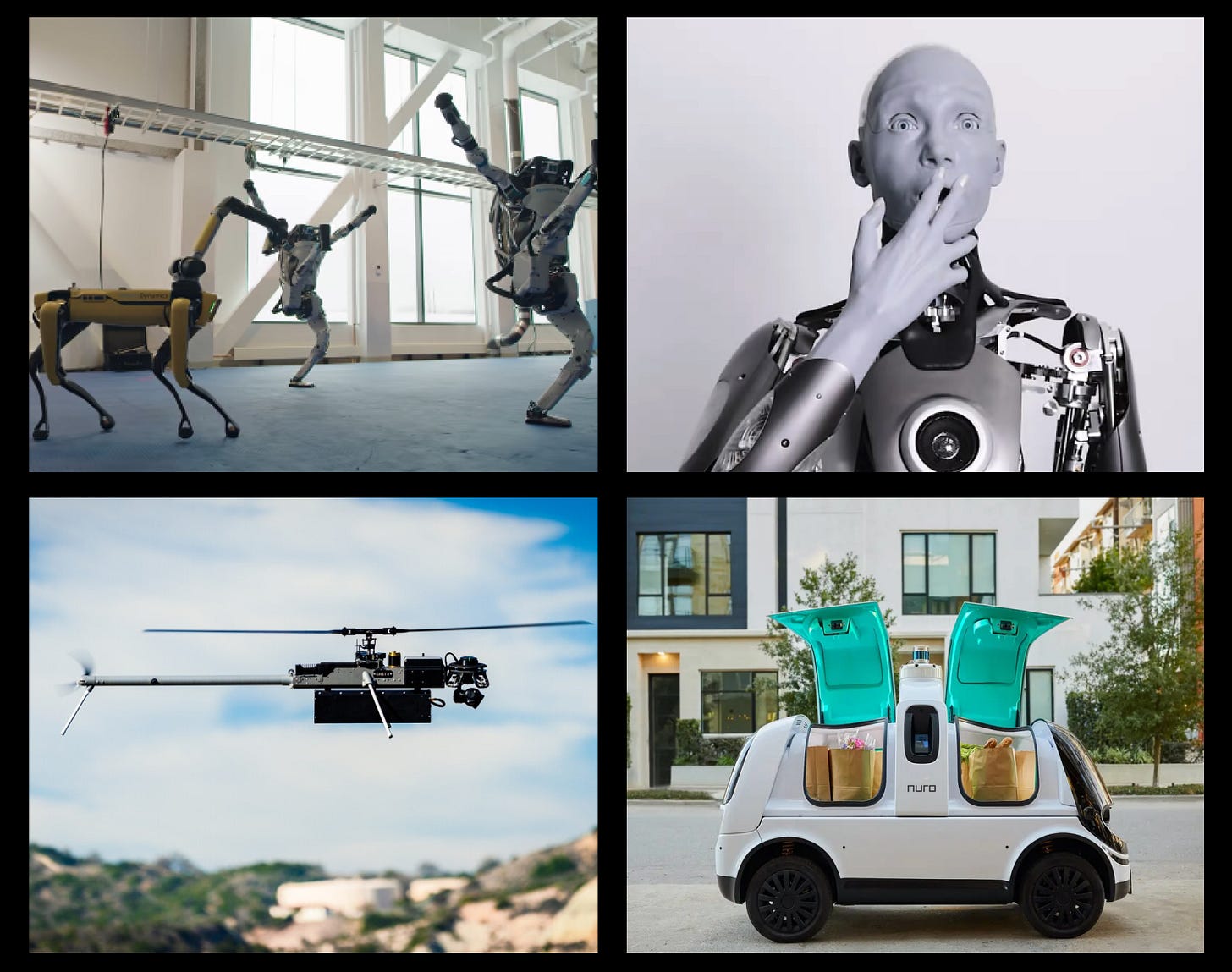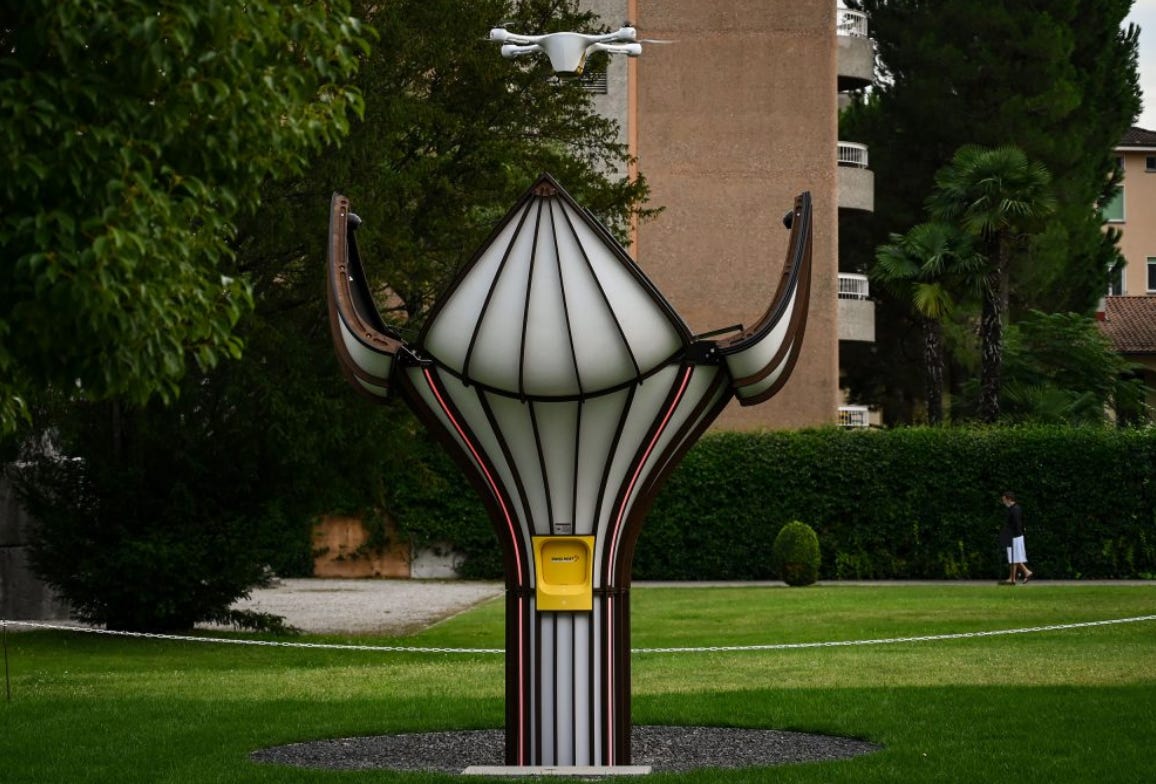Rise Of The Machines
Robots are here, a heated debate and Greek robotics startups, two teams in Y Combinator, why engineers leave a company, email marketing tips, jobs, events and more
Welcome back! This is the newsletter with everything you need to know about Greek startups, delivered to your inbox every two weeks. You can reach me on Twitter or LinkedIn. Join 3,800 readers by subscribing here:
Rise Of The Machines
Robots are coming… Scrap that. Robots are here. And I don’t mean the ones in car factories or the Christmas toys we buy kids. I mean the kind you see and read about in Sci-Fi shows, movies and books. Robots that dance (Boston Dynamics), look like humans (Engineered Arts), defend territories (Anduril), deliver pizzas (Nuro).
Last year, more than $17 billion poured into robotics startups, nearly triple the investment in 2020. And this year, autonomous vehicle maker Cruise made the headlines for raising $1.35 billion from SoftBank and winning the first California permit to carry paying riders in driverless cars. But, what does it take to build intelligent systems or intelligent robots? What’s the innovation that has accelerated progress?
I think the biggest innovation we’ve seen is machine learning and it’s the idea that computers can basically teach themselves. The idea that computers can find their own rules so they can learn from falling down and getting up, the same way children do, and this evolution has led to a capability that’s completely unmatched. Today’s computers can watch experts do their jobs (doctors, lawyers, etc), pick up the regularities, learn those rules and become as good as the best experts.
Sebastian Thrun, self-driving car pioneer, on Lex Fridman Podcast
Machine learning has revolutionised robotics from making sense of an environment to acting upon specific tasks. No doubt about that. Let’s zoom in for a second on a heated debate: how do robots see to achieve autonomy? Enter Cameras vs LiDAR.
LiDAR, which stands for Light Detection and Ranging, uses laser to target objects or surfaces, repeating this process millions of times per second. By measuring the time it takes for the reflected light to return to the receiver, we calculate distances and create real-time 3D maps of the environment, even under diverse lighting conditions. All of this happens outside the visible spectrum. So, a computer can utilize the 3D representation of the surrounding environment for navigation. In fact, one of the most successful creators of LiDAR systems, particularly for atmospheric research (environment, meteorology, etc), is the Greek Raymetrics, founded in 2002 and working with the national weather services of the UK, Germany, Singapore and the European Space Agency. Despite the various applications of LiDAR technology, cost has historically been one of its major disadvantages. Think tens of thousands of dollars per sensor. Elon Musk famously called it a “fool’s errand” and “expensive sensors that are unnecessary” during Tesla Autonomy Day. However, several teams have made a bet on LiDAR, trying to reduce the cost significantly. What’s the alternative here? Cameras and Computer Vision.
(Computer) vision is the future. I can say that without reservation. I think the primary environmental understanding sensor is going to be a visual system.
Colin Angle, founder of iRobot (Creators of Roomba / robot vacuums and mops), on Lex Fridman Podcast
Computer Vision is a field of AI that enables computers to derive meaning from images or videos by feeding them with vast amounts of labelled data as training input. Pattern Recognition 101. Essentially, it mimics human vision; we see something we’ve seen before and know what that is. So, embedded cameras in robots are the eyes that gather visual inputs from the outside world, and with Computer Vision, robots make sense of their environments (objects, movements, etc). Even though one of the main arguments in favour of vision-only autonomous vehicles is nature (the same way we don’t shoot lasers from our foreheads to create 3D maps, computer vision should be enough for navigation), we might not be there yet.
Despite notable advances in computer vision, our visual system remains far superior to the best AI algorithms in the majority of visual tasks. Computer vision algorithms are still fragile (e.g. they are easy to fool through adversarial attacks) and struggle to extrapolate to out-of-distribution samples.
Gabriel Kreiman, Professor at Harvard Medical School and associate director of MIT’s Center for Brains, Minds and Machine on Biological and Computer Vision

Within this immensely interesting space, several Greek-founded startups are making waves. I’ll start with Myrmex, which was acquired by British online supermarket and technology group Ocado. Calling it a “supermarket” doesn’t do justice to what Ocado has built. It’s more like the “automated warehouse of the future” and Myrmex certainly fits in this vision. Founded in 2015 by Ioannis Kanellos and Orestis Fainekos, Myrmex has been working on a fully unmanned grocery delivery system. This demo video of their automated grocery pickup unit is impressive.
Matternet. Founded in 2011 by Andreas Raptopoulos, Matternet has created an urban drone delivery platform. UPS used its drones to deliver COVID-19 vaccines to a hospital in North Carolina and the Emirate of Abu Dhabi distributes and transfers medical supplies through its first city-wide drone network powered by Matternet.
But these are not the only ones. Here’s a list of 21 Greek-founded robotics startups with a brief description of each one of them.
Disclaimer: The list is by no means exhaustive. Funding information was gathered from public online sources and for companies that haven’t publicly disclosed their funding amount or are bootstrapped the equivalent field is blank.
Thanks to George Papastergiou for feedback and comments.
Startup Jobs
Looking for your next opportunity? Check out job postings from Greek startups in Greece, abroad, and remotely.
News
Solar and battery storage monitoring company, Inaccess, was acquired by a US-based renewable energy software provider. Inaccess was founded in 2000 and the majority of its team is based in Greece.
Greek power utility Public Power Corp (ΔΕΗ) acquired e-mobility startup Carge to help upgrade its network of charging stations for electric vehicles.
Fishtail, a startup that allows freight forwarders to offer financing to their customers within minutes, raised $4.5m in Seed funding.
Zenus AI, an ethical facial analysis startup, raised a funding round from Genesis Ventures.
Two Greek-founded teams got in the latest batch of Y Combinator (S22): the proptech startup HOMLI which creates a modern real estate brokerage to help Europeans sell, rent and buy real estate, and a crypto startup still in stealth mode.
Applications are open for registered companies to Elevate Greece to apply for funding of up to €100k.
Startup incubator Orange Grove is accepting applications until the 18th of September.
The winners of the 12th NBG Business Seeds competition are Deepmed, GEP Drones, ΑidPlex, Metabio and six more teams.
Startup Profiles
Metrika, Think Silicon, Wikifarmer
Interesting Reads & Podcasts
Yiannis Martinos, founder & CEO of Signal Group, talks about his upbringing in a family with deep roots in shipping, creating Signal Group, the digital transformation, of the shipping industry and more, here.
A podcast with Apostolos Apostolakis, Partner of VentureFriends, on the current tech market sentiment, what they look for in teams to invest and ideas to cultivate the startup ecosystem in Greece.
Why explore Venture Debt as a financing option for your startup, insights about the process, basic terms to look for, and more from Thaleia Misailidou, Principal at Marathon Venture Capital, here.
New Mikri Kouventa episode with Antonis & Paris. Why do software engineers leave a company?
A short intro to a method of cryptography called Zero-Knowledge Proofs, and how the hardware technology of FPGAs is a great fit for ZKP generation by the InAccel team.
A capital allocator’s perspective on blockchain with Marcos Veremis, Partner at Accolade Partners, and his approach to manager selection, due diligence, portfolio construction and oversight, here.
Five things to watch out for when reading product metrics by Manos Kyriakakis, Head of Product & Growth at Simpler, here.
Email marketing tips for startups from Maria Avgerinou, Senior CRM Marketing Manager at Blueground, here.
Events
“21o Open Coffee Heraklion” by Open Coffee Heraklion on Jun 24
“A story about the refinement of a data lake with thousands of partitions” by AWS User Group Greece on Jun 29
“Developing on Bitcoin Lightning” by Bitcoin & Blockchain Tech Meetup on Jun 30
If you find this newsletter interesting, consider sharing it with friends, or subscribing if you haven’t already.
Thanks for reading and see you in two weeks,
Alex





